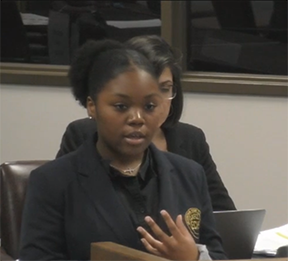• by Quardasha Mitchell • IDRA Newsletter • June-July 2020 •


See the video of her testimony and others.
Why we should approve the standards for this class should not be a question that I should have to answer. This course is one of the most informational, yet intriguing courses to me. Why? Because it is about the history of my people that I once knew little of and the history that is overlooked in the books that we have in school today.
I used to sit in history class and wonder, “Why don’t they teach us more about the history of African Americans?” I often get angry because the history that we learn is more than just Christopher Columbus and the people who took land from the Native Americans.
We need to know the real history of African Americans because what is taught in schools about African Americans is limited.
In history, we should know more than just Harriet Tubman, Rosa Parks and Martin Luther King, Jr. Yes, all of them are important. However, like in my African American Studies course, why don’t we learn more about Nat Turner, an enslaved African American who led one of the largest slave rebellions to take place in the United States? But we don’t hear about that.
We are important, and so is our history. This course is significant to not only Black people but to non-African Americans as well. They are able to see that African Americans are very powerful individuals and that we also are a part of history.
Too much of our history has been concealed. And it seems as if my ancestors were just people who worked on plantations and picked cotton. When in fact my ancestors put their blood, sweat and tears into becoming the people that they are today: successful.
Yet, all of that is swept under the rug and is kept away in a bottomless hole that people don’t get to hear about either.
We are tired of getting treated as if we were duds. We’re tired of feeling like we aren’t important enough to be spoken about.
We are important, and so is our history. This course is significant to not only Black people but to non-African Americans as well. They are able to see that African Americans are very powerful individuals and that we also are a part of history.
It is very encouraging to learn about what Black people have accomplished throughout the years, rather than just learning about how they were slaves when, in reality, they were more than slaves. And it is important that children in schools should know that too.
We are among the most misrepresented and misunderstood, and that needs to change. Therefore, this class will give us the representation that we need and break stereotypes that many have about us. The obstacles that Black people have experienced are essential to include in education, along with their own perspectives. It is crucial that our schools include a vast amount of academic diversity.
So, please keep this course. It will not only give students a profound amount of understanding about the history of African Americans, but also the contributions made by them that are not taught in American history.
Quardasha Mitchell is a student at Trinidad Garza Early College High School in Dallas.
[©2020, IDRA. This article originally appeared in the June-July 2020 IDRA Newsletter by the Intercultural Development Research Association. Permission to reproduce this article is granted provided the article is reprinted in its entirety and proper credit is given to IDRA and the author.]


